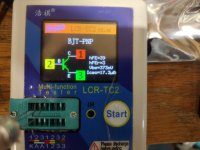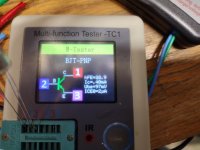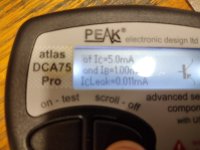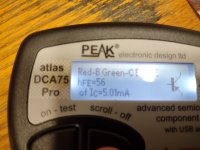I have a Crenova 890z multimeter that seems to work well, but when using the little NPN/PNP ports to double check hfe the readings are wildly off of what a pair of TC1s say. I wound up with two TC1s last year, so in certain situations it's good to try both - they're typically very, very close to each other.
Some recent TC1 readings had me wondering what a different tester would say, so I broke out the Crenova. It was a little tricky to make good contact in the ports, but once I did the readings were WAY off what both TC1s said. I of course made sure the pinouts matched. Tried a handful of basic silicon transistors and each and every one was off by a LOT.
I wish I had a DCA55, as it would be the final word. Are multimeter hfe ports known to be bad, or is mine just a lemon?
Some recent TC1 readings had me wondering what a different tester would say, so I broke out the Crenova. It was a little tricky to make good contact in the ports, but once I did the readings were WAY off what both TC1s said. I of course made sure the pinouts matched. Tried a handful of basic silicon transistors and each and every one was off by a LOT.
I wish I had a DCA55, as it would be the final word. Are multimeter hfe ports known to be bad, or is mine just a lemon?





